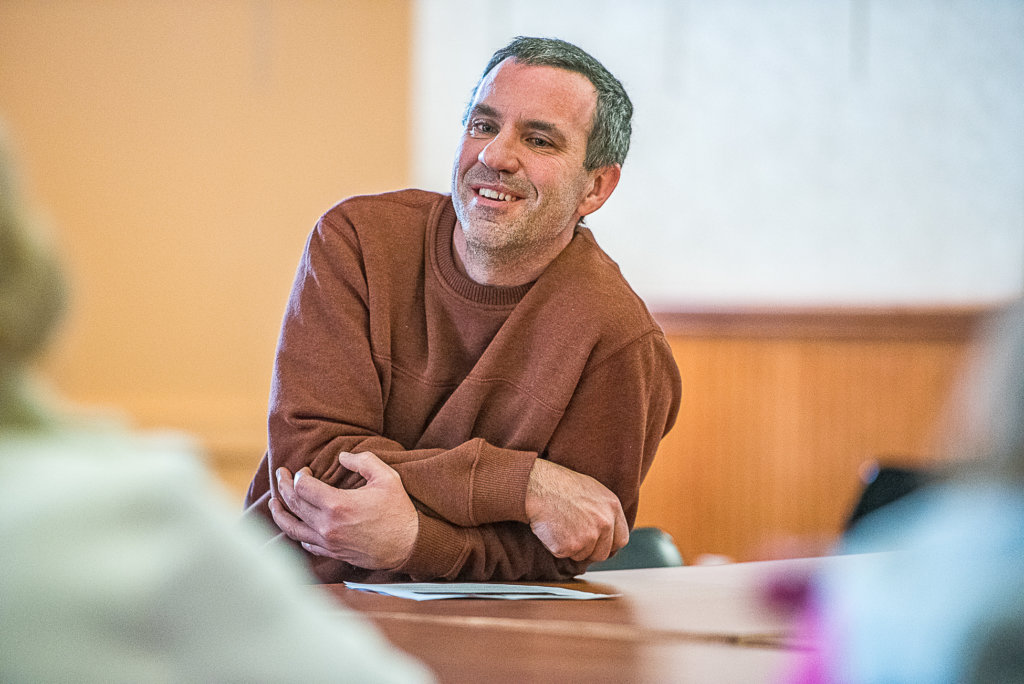
Marty Gagnon, the Auburn Library Adult Services librarian, leads a discussion on Wednesday afternoon at the Auburn Public Library titled “Where do you get your news?” which addressed the topic of “fake news.” (Andree Kehn/Sun Journal)
AUBURN — The phrase “fake news” was uttered hundreds of times in February at the Auburn Public Library, and after a string of media-literacy events concludes Thursday, library staff are hoping the conversation continues.
A film screening of “All the President’s Men” on Thursday at 6 p.m. will wrap up a month of media-literacy programming at the library after it was only one of five in the nation to be chosen to participate in a pilot program aimed at training library staff to help their customers become better news consumers.
The program was spearheaded by the American Library Association and the Center for News Literacy at Stony Brook University, and the library partnered with the Sun Journal on the programming.
On Wednesday, a discussion called “Where do you get your news?” was held at the library, where participants were asked where they get their news, what sources they trust and how they filter what is true from what is fake.
A small group of participants summarized how complicated it is to distinguish trustworthy news in an era when accusations of “fake news” are now routine.
Many said they prefer a balance of various newspapers, television broadcasts and online sources, but said it’s increasingly difficult to verify multiple news sources to pin down the facts.
“I don’t know what to believe anymore,” one woman said.
Others said the 24-hour news cycle, which is often politically-charged and full of negative news, can also weigh on people, causing them to tune out.
“If I need to know it, someone’s probably going to tell me,” another woman said.
One participant said he tries to switch news cycles between CNN, MSNBC and Fox News. Personalities from across the political media spectrum were also mentioned – from Rush Limbaugh to John Oliver.
One woman said she’s found The Drudge Report to be the most unbiased source for her, though it’s often labeled as a conservative-leaning aggregate news site.
Gagnon gave tips to the participants that the library has been circulating all month, including to check the author’s credentials, check the website URL, consult and compare competing sources, and fact-check stories with sites like Snopes or Politifact.
He said he teaches his children to “double-check” news they read between multiple sources, especially as most young people are turning to their mobile devices for news.
While many said that news sources often carry some slant in their reporting, one participant said he doesn’t believe there is a definite “liberal media” versus “conservative media” divide among networks.
“I don’t think it’s a fair criticism,” he said. “And I know I’m probably in the minority, because people have already been channeled to think if you look at CNN, it’s liberal media and that’s it.”
Gagnon said Wednesday that, based on the recent interest, the library may continue the media literacy events. He described the pilot program as an “initial thrust into libraries” and said the program hopes to expand. He said a few libraries have already reached out to ask about what Auburn has been doing.
A recent discussion led by Bates College professor Stephanie Kelley-Romano also had a good turnout, he said. Kelley-Romano is an associate professor of rhetoric, and hosted a program called, “The Rise of Fake News.” She recently taught a class at Bates where students conducted a mock presidential election.
Library Director Mamie Anthoine Ney, who was at Wednesday’s event, has said media literacy programs are important, especially in a time when news moves so quickly that it becomes easier for facts to get skewed – often deliberately.
“In today’s often toxic world of deliberate misinformation, we need to be able to help our community separate fact from fiction and make intelligent and informed decisions when hearing the news on the local or national scene,” Ney said.
During Wednesday’s talk, Ney said she recently posted a story on social media from The New York Times titled, “How fake news goes viral: A case study.”
Within 57 seconds, she said, someone commented “fake news.”
Comments are no longer available on this story